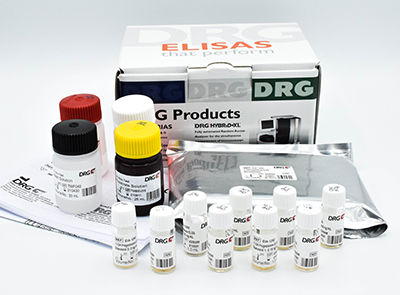
- Laboratory
- Laboratory medicine
- Cellular biology test kit
- DRG Instruments GmbH
Cell metabolism test kit EIA2935C-peptidefor insulinglucose
Add to favorites
Compare this product
Characteristics
- Application field
- for cell metabolism
- Tested parameter
- C-peptide, for insulin, glucose
- Sample type
- serum, plasma
- Analysis mode
- ELISA, enzyme immunoassay
- Result display time
15 min, 30 min
- Sample volume
0.025 ml
(0.00085 US fl oz)
Description
An enzyme immunoassay for the quantitative measurement of insulin in serum and plasma. Insulin is the principal hormone responsible for the control of glucose metabolism. It is synthesized in the Beta-cells of the islets of Langerhans as the precursor, proinsulin, which is processed to form C-peptide and insulin. Both are secreted in equimolar amounts into the portal circulation. The mature insulin molecule comprises two polypeptide chains, the A chain and B chain (21 and 30 amino acids respectively). The two chains are linked together by two inter-chain disulphide bridges. There is also an intra-chain disulphide bridge in the A chain. Secretion of insulin is mainly controlled by plasma glucose concentration, and the hormone has a number of important metabolic actions. Its principal function is to control the uptake and utilisation of glucose in peripheral tissues via the glucose transporter. This and other hypoglycaemic activities, such as the inhibition of hepatic gluconeogenesis and glycogenolysis are counteracted by the hyperglycaemic hormones including glucagon, epinephrine (adrenaline), growth hormone and cortisol. Insulin concentrations are severely reduced in insulin-dependent diabetes mellitus (IDDM) and some other conditions such as hypopituitarism. Insulin levels are raised in non-insulin-dependent diabetes mellitus (NIDDM), obesity, insulinoma and some endocrine dysfunctions such as Cushing’s syndrome and acromegaly. The DRG Insulin ELISA Kit is a solid phase enzyme-linked immunosorbent assay (ELISA) based on the sandwich principle. The microtiter wells are coated with a monoclonal antibody directed towards a unique antigenic site on the Insulin molecule.
Catalogs
No catalogs are available for this product.
See all of DRG Instruments GmbH‘s catalogsRelated Searches
- Assay kit
- Blood assay kit
- Serum assay kit
- Immunoassay assay kit
- Plasma assay kit
- Infectious disease detection kit
- Research reagent kit
- Molecular test kit
- Respiratory infection test kit
- Clinical assay kit
- Optical assay kit
- Reagent medium reagent kit
- ELISA assay kit
- Research assay kit
- Bacteria reagent kit
- IgG test kit
- Laboratory detection kit
- Cell assay kit
- Urine assay kit
- Tissue detection kit
*Prices are pre-tax. They exclude delivery charges and customs duties and do not include additional charges for installation or activation options. Prices are indicative only and may vary by country, with changes to the cost of raw materials and exchange rates.

